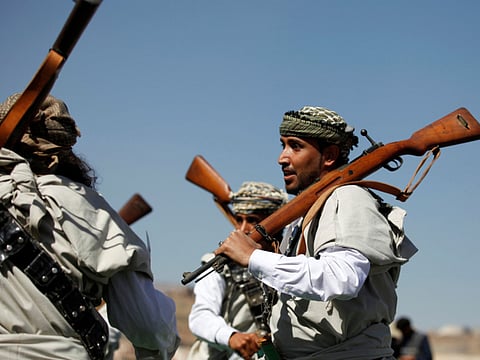Cold War in Mideast reaches a boiling point
Tehran’s malignant influence continues to cast its shadow on the GCC-Iran relationship. The escalation does not bode well for the region

Once again, the ongoing cold war between Saudi Arabia-led Gulf Cooperation Council (GCC) on one hand and Iran on the other is heating up, because of the aggressive and bellicose behaviour of Iran in supporting its proxies and fomenting sectarian tensions, stoking instability and meddling in the affairs of the GCC states and other Arab countries to advance its hegemonic project.
Kenneth Katzman in his paper ‘Iran’s Foreign and Defence Policies’ for the Congressional Services, published on March 20, 2018, argues: “Iran’s national security policy is the product of many, and sometimes competing, factors: The ideology of Iran’s Islamic revolution; Iranian leaders’ perception of threats to the regime and to the country; long-standing Iranian national interests; and the interaction of the Iranian regime’s various factions and constituencies ... Iran’s foreign and defence policies are products of overlapping, and sometimes contradictory, motivations. One expert has characterised these contradictions as indecision over whether Iran is a “nation or a cause”. This is Iran’s predicament after 39 years of its revolution, which has caused a tectonic shift that has changed the dynamics of the entire region. Iran has not settled in and moved from its revolutionary zeal into a nation-state that its neighbours, especially in the GCC states, could live and deal with normally.
No understanding of the cold war between the two shores of the Arabian Gulf is possible without factoring in two important points: The first is the simmering hostilities between the United States and Iran since the outbreak of the Islamic Revolution in Iran almost four decades ago. Second, the continued lack of a unified GCC front vis-a-vis the threat from Tehran. The continued divergent GCC view towards Iran is a bitter reality that Iran continues to exploit.
The GCC-Iran cold war was exacerbated after the toppling of Saddam Hussain in Iraq 15 years ago by the US-led war, which gave Iran a freehand to roam not only in Iraq, which has come under Iran’s tutelage, but to expand unhindered in many Arab states.
In the aftermath of Arab Spring, the Iranian establishment boasted of controlling four Arab capitals —- Baghdad, Damascus, Beirut and Sana’a — through its Arab proxies.
This environment reached a boiling point, with the Saudi Arabia-led Arab Coalition three-years ago launching Operation Decisive Storm in support of the embattled legitimate Yemeni President Abd Rabbo Mansour Hadi, who was toppled by the Iranian-backed Al Houthi militias, who took over the country. Iran has been accused repeatedly of supporting, funding and arming Al Houthis, who have had the audacity to launch missiles at Saudi Arabian cities, reaching as far as capital Riyadh, as they did last November and again last Sunday.
The Iranian Revolutionary Guards has denied supplying Al Houthis with weapons, although the America’s Ambassador to the UN, Nikki Haley, displayed last December in Washington, recovered pieces of a missile fired by Al Houthis from Yemen into Saudi Arabia. “A smoking gun”, and a concrete proof that Iran is violating UN resolutions by supplying weapons to a rebel group in Yemen,” Haley said.
Clearly, the rhetoric of the administration of United States President Donald Trump and the threat of pulling out of the Joint Comprehensive Plan of Action (JCPOA) between Iran and the P5+1 (US, Britain, France, Russia, China plus Germany) over the Iran nuclear deal have triggered hysterical reactions in both Washington and Iran.
If a worst-case scenario, if Trump pulls out of the agreement by May 12, it will no doubt open a Pandora’s Box, which could manifest itself in a paranoid and emboldened Iran, with mischief orchestrated by the hardliners in the Iranian regime. This could see Iran resume its nuclear programme free from the shackles of JCPOA limitations. This undoubtedly, will set off a nuclear arms race in our neighbourhood, especially after the recent bold admission by Saudi Arabian Crown Prince Mohammad Bin Salman that Iran is not a rival and far from being equal to Saudi Arabia and Saudi Arabia does not want to acquire any nuclear bomb. “But without a doubt, if Iran develops a nuclear bomb, we will follow suit as soon as possible,” he said.
The last thing the Gulf region needs is a nuclear arms race and nuclear proliferation, in a perilous area that has experienced more than its fair share of wars, upheavals and upsizing of military power.
These escalations do not bode well for the future stability and security of the Arabian Gulf region. Trump assembling a military Cabinet of hawks itching for confrontation with Iran, and pulling out of the nuclear agreement, will no doubt push the cold war to a boiling point.
Professor Abdullah Al Shayji is a professor of Political Science and the former chairman of the Political Science Department, Kuwait University. You can follow him on Twitter: @docshayji.


